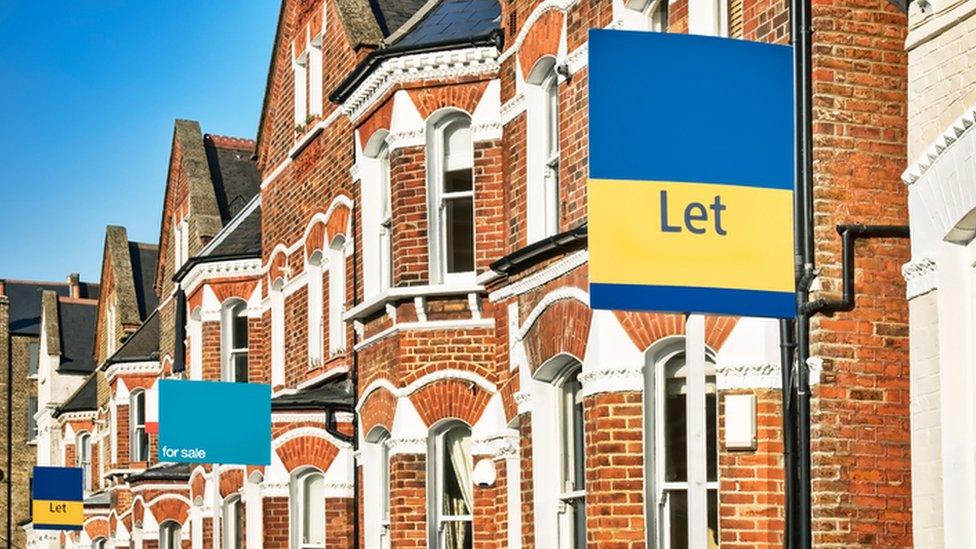No DSS: Most flat shares refuse benefit claimants
- Published
- comments

People have more chance of finding a room or flatshare that allows pets than allows benefits claimants
Landlords are more likely to accept potential renters who own pets than people claiming benefits, a BBC investigation has found.
Analysis of some 11,000 online listings for spare rooms found all but a few hundred stated benefit claimants were not welcome.
Campaign groups say it is "naked discrimination" and are calling for a change in the law.
Landlords say more social housing needs to be built.
The BBC England data unit analysed listings on the website SpareRoom, looking at London and 18 other towns and cities across England.
Out of 11,806 adverts for rooms to let, just 2% were open to people on benefits.
The website's listings showed not a single vacancy for a benefit claimant in Bournemouth, Exeter, Leicester, Liverpool, Norwich, Oxford or Reading.
Plymouth had the highest rate of acceptance, but even that was just 10% of rooms, 15 out of 144.
Across the 19 areas with the most available rooms, there were twice as many lets that accepted pets as accepted housing benefit claimants.
It was a similar pattern on a letting agent website.
On OpenRent.co.uk, just 580 out of 3,342 listings for the same areas accepted people on benefits.
The websites specify "No to DSS" in flatmate preferences. DSS is the acronym for the Department of Social Security, which was replaced in 2001 by the Department for Work and Pensions.
For more stories from the BBC England data unit follow our Pinterest board., external

'I quickly learned to just not tell people'
Eva describes her six-month search for a place to live as "humiliation".
The 33-year-old from Hackney works part time designing and building furniture, while bringing up seven-year-old son Bobby.
Yet the cost of rent is so much her earnings do not cover it, and like many thousands of people she has to claim housing benefit.
"I eventually got somewhere because I had a UK-based guarantor, but I also have not told my landlord I receive benefits," she says.
"I was looking for a two-bedroom flat because my landlady wanted back the one I had been living in for five years.
"Every time I'd be asked if I was working. When I said yes I was asked how much I earned. When I said I received housing benefit, that was it."
It was the summer of 2015 when Eva was given two months' notice. Yet it was the December by the time she had found somewhere to go.
"The local council would only consider us for the waiting list if we had a bailiff's letter," Eva, whose full name we are not disclosing, says.
"I rarely got an explanation as to why landlords would not accept us.
"One person told me it was something about the freehold not allowing her to rent people on benefits.
"Another said 'it's the others giving you a bad name'. Some would insist on three or even six months' rent in advance.
"I quickly learned to just not tell people."

Campaign group Digs, which supports people renting in Hackney, said barring benefit claimants was "naked discrimination".
Spokeswoman Heather Kennedy said: "People claim housing benefit for different reasons, including because they're disabled, caring for others or escaping a violent relationship. And as rents have sky-rocketed and wages stagnate, more and more working people are having to claim benefits to cover their rent.
"Landlords and agents have far too much power in relation to ordinary people. The only way to fix this is proper regulation, to protect people from a rental market which the government have now finally accepted is badly broken."
Roger Harding, a director at the homelessness charity Shelter, said: "We all know how difficult and stressful it can be to find somewhere to live.
"But, for the many renters who rely on local housing allowance to top up their income in order to meet the rent, finding somewhere to live is almost impossible.
Mr Harding said the government's freeze on housing allowance had left "little incentive for landlords to want to rent to people whose pockets are starting to feel the pinch".

How the rules changed in Ireland

Changes to equality law for the rental market came into force in Ireland in January 2016.
From that point on, anyone in receipt of rent supplement, housing assistance or other social welfare payments could no longer be discriminated against when it came to accommodation or related services.
Advertisers can also be held liable for discrimination if they publish anything indicating discrimination.
People who are discriminated against in Ireland can take it to the Workplace Relations Commission, external, which can fine landlords up to €15,000 (about £12,900).
A spokewoman for the Irish Department of Jobs, Enterprise and Innovation said there had so far been 45 complaints "citing rent supplement or another payment under the Social Welfare Acts as a ground of discrimination".

How affordable is rent in your area?

What the landlords say
The National Landlords Association said cuts in welfare meant benefit payments in many parts of the country "no longer cover the rent".
It said the private rented sector now accounted for 20% of UK households and had doubled in size since 2002, while social housing had fallen and now made up 17% of households.
Landlords have had difficulty getting mortgages and insurance as some providers will not cover them if they let to tenants on benefits.
Tenant and landlord lawyer Tessa Shepperson, external said: "A lot of insurance companies specify the property should not be for DSS, just as many state no asylum seekers or no students. That's a problem for landlords who need to have insurance.
"Many say that DSS tenants are excellent tenants, that they pay on time and look after the property, but there's nothing they can do without insurance."
She added that mortgage lenders can be put off by the delay in processing housing benefit applications, which can lead to landlords not being paid on time.
In 2013 The Mortgage Works, external, a subsidiary of the Nationwide Building Society, removed an exclusion on tenants and benefits for buy-to-let following concerns raised by customers.
Richard Lambert, chief executive of the association, said: "Most landlords support the construction of social housing as a better investment of government funds.
"Not only would this mean more housing available and affordable for those most in need, it would also relieve the pressure on the private sector that creates the breeding ground for the minority of rogues and criminals who get away with providing substandard housing."
Read more on housing from BBC News

'Sky-high' rental hotspots revealed
Homes 'too expensive' for Help to Buy Isa
Help to Buy scheme's impact revealed
The Royal Institution of Chartered Surveyors (RICS) said on Thursday that access to private rented properties was falling among people on housing benefits.
A survey of private landlords found caps to housing benefits were cited by 29% of respondents as a key reason why those on lower incomes were being pushed out of the rental market.
Matt Hutchinson, director of SpareRoom, said: "It's a sad fact it can be a real struggle to find places to rent if you rely on benefits.
"When we've surveyed landlords to find out why, the overwhelming response has been issues with rent being paid in full or on time.
"In the long term the best course of action isn't to stop discrimination against people receiving benefits, it's to reverse the decision taken in the 1980s to subsidise people, rather than things.
"We spend £27bn a year, external on Housing Benefit. If we spent that on building homes, rather than helping people afford ever escalating costs, we could solve the housing crisis."
The Department for Work and Pensions said under Universal Credit housing costs and support are paid direct to the tenant, not the landlord. That would mean the only way a landlord would be aware a tenant was in receipt of support would be if the claimant themselves told them.
The Department for Communities and Local Government declined to comment.
Reporting team: Daniel Wainwright, Paul Bradshaw, Pete Sherlock
- Published9 November 2016

- Published7 March 2017
